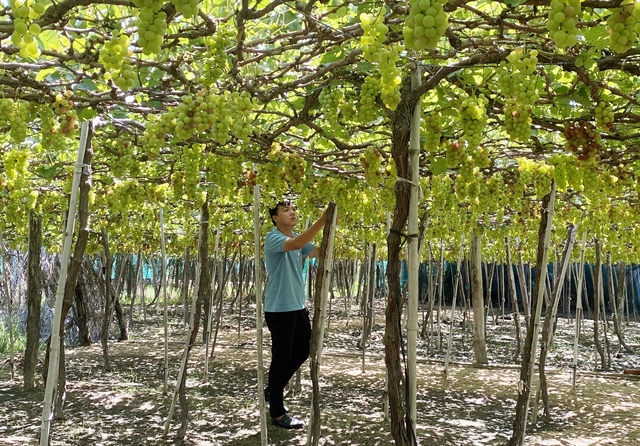 Society
Society

 |
| A grape orchard of a member of the Ninh Thuận Evergreen Grape Co-operative in Ninh Thuận Province’s Phan Rang-Tháp Chàm. — VNA/VNS Photo Công Thử |
NINH THUẬN — Ninh Thuận Province is supporting producers to develop brand names for specifically identified products and OCOP products under the country’s one commune-one product programme.
Ninh Thuận, which is the country’s driest province, has 12 specifically identified products, including grape, jujube, asparagus, aloe vera, sheep and goat.
The south central province also has 69 OCOP products rated from three to five stars under of the OCOP programme, with the highest star being five.
OCOP products include commercial products and services such as food and beverages, handicrafts and rural tourism services.
Ninh Thuận is the country’s largest producer of some farm products such as grape, jujube and sheep.
It has developed two geographical indication certificates for grape and sheep, 10 collective brand names and nine brand names for products and services.
The 10 collective brand names are Văn Hải clean vegetables, An Hải clean vegetables, Bàu Trúc pottery, Mỹ Nghiệp brocade weaving, Ninh Thuận jujube, Phan Rang garlic, Bác Ái dried bamboo shoots, Văn Hải VietGAP grapes, Bác Ái black pigs and Thuận Bắc chicken.
The Mỹ Nghiệp Chăm Brocade Weaving Co-operative in Ninh Phước District’s Phước Dân Town has its products produced under the collective brand name of Mỹ Nghiệp brocade weaving.
Phú Văn Ngòi, director of the co-operative, said the co-operative’s products are labeled with the collective brand name logo and QR code stamp for consumers to check the origin and other information.
The co-operative is promoting the collective brand name of Mỹ Nghiệp brocade weaving, investing in improving its product quality and co-operating with travel companies to offer tours to the Mỹ Nghiệp brocade weaving village, he said.
The village in Phước Dân is one of the province’s most famous traditional craft villages and is home to Chăm ethnic people.
The province has implemented various policies to assist producers, co-operatives and companies to register brand names for their products and promote sales.
Its many products have been sold on agricultural product websites and e-commerce platforms.
The provincial People’s Committee has approved a plan to develop an intellectual property strategy to promote the production and value chains of agricultural products to 2030, costing VNĐ39.2 billion (US$1.6 million).
It targets to have specifically identified products and OCOP products that are supported to register by geographical location, collective brand names or brand names account for at least 40 per cent in 2025 and 60 per cent in 2030.
It also targets the number of products registering for brand names will increase by 13-15 per cent a year.
The province will mobilise resources from various programmes and projects to assist producers, co-operatives and companies to apply advanced science and technology, and produce products under value chains, according to Lê Huyền, deputy chairman of the provincial People’s Committee.
It will organise more trade promotion activities to advertise products with brand names, he said.
It will increase the quality of human resources and provide knowledge for farmers, co-operatives and production establishments to improve their productivity, produce high quality products and meet market requirements, he said.
Develop linkages
Ninh Thuận is expanding linkages between stakeholders in agricultural production to secure outlets and improve income for farmers.
The provincial Department of Agriculture and Rural Development and localities have assisted farmers, co-operatives and companies to develop 57 linkages for growing 14,276ha of crops so far this year.
The linkages have helped farmers improve incomes, contributed to building new-style rural areas, and helped companies have quality inputs and products, according to the department.
Đông Nam Seed Joint Stock Company in the city of Phan Rang-Tháp Chàm contracted with farmers of the Công Hải Rice Seed Producing Co-operative Group in Thuận Bắc District to produce rice seeds on a total area of 70ha for the summer-autumn crop this year.
Nguyễn Lâm Danh, director of Đông Nam, said the company has implemented a closed production circle and co-operated with scientists and related stakeholders to produce quality seeds.
“The company chooses rice fields that have few diseases and grows one or two rice crops a year. After being harvested, rice seeds are processed properly, so they have high quality and a high germination rate,” he said.
The Nam Miền Trung Hi-tech Agriculture Co-operative in Bác Ái District has linked with farmers to grow honeydew melon in green houses.
The co-operative supplies input materials and farming techniques for farmers and secures outlets for them.
Nguyễn Trọng Cảnh, director of the co-operative, said the co-operative’s honeydew melons have been granted a production code that meets export requirements.
“To increase its product competitiveness and develop sustainably, the co-operative is expanding linkages with farmers to transfer the application of advanced farming techniques in production,” he said.
To further develop linkages, the provincial Department of Agriculture and Rural Development, in co-operation with relevant departments, agencies and localities, will boost restructuring agricultural production and developing key products and specifically identified products in combination with their geographical indication development.
The province plans to attract investment for linkages in agricultural production and develop high-tech and organic agriculture, according to the department. — VNS